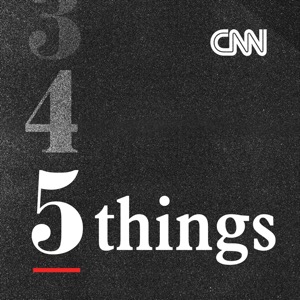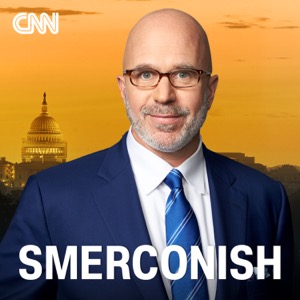podcast
CNN One Thing
You’ve been overwhelmed with headlines all week – what's worth a closer look? One Thing takes you into the story and helps you make sense of the news everyone's been talking about. Each Sunday, host David Rind interviews one of CNN’s world-class reporters to tell us what they've found – and why it matters. From the team behind CNN 5 Things.

Why SCOTUS Is Saving Trump Immunity for Last
CNN One Thing
Jun 30, 2024
The Supreme Court wraps up its current term on Monday. Justices are finally expected to issue a major decision on presidential immunity as it relates to special counsel Jack Smith's election subversion charges against former President Donald Trump. Another decision limiting obstruction charges for January 6th rioters could also have ramifications in that case. In this episode, we break down what it said and why a separate ruling is sending shockwaves through the federal government.
Guest: John Fritze, CNN Supreme Court Reporter
Episode Transcript
David Rind
00:00:02
At the CNN presidential debate on Thursday, CNN's Jake Tapper asked former President Donald Trump about his role in the January 6th attack on the US Capitol in 2021.
Jake Tapper
00:00:14
What do you say to voters who believe that you violated that oath? Through your actions and inaction on January 6th and worried that you'll do it again?
Former President Donald Trump
00:00:21
Why do they? Too many believe that. And let me tell you about January 6th. On January 6th, we had a great border.
David Rind
00:00:28
Nobody cared. Trump repeatedly sidestepped the question he deflected about accepting the election results in November, before finally saying he would. If it's a, quote, fair and legal and good election.
President Joe Biden
00:00:39
The only person on the stage is a convicted felon. This man I'm looking at right now. And the fact of the matter is, he isn't is what he's telling you is simply not true.
David Rind
00:00:49
President Biden made the point there. Trump has already been convicted of 34 felony counts, but there are multiple criminal cases still in motion, one of them directly related to his efforts to overturn the 2020 election. Well, on Friday, the Supreme Court handed down a major ruling dealing with the aftermath of the January 6th riot at the Capitol. This one wasn't about presidential immunity. My guest today is CNN Supreme Court reporter John Fritzy. We're going to break down why we're still waiting for that decision, and look at another ruling that is sending shockwaves through the entire federal government. From CNN. This is one thing I'm David Ryan. So you're literally in the Supreme Court right now?
John Fritze
00:01:41
Correct. I'm in the building.
David Rind
00:01:42
Is in the building. So, John, we've reached the end of June, but the court hasn't finished its work yet. What's up with that?
John Fritze
00:01:50
Everything has been slow this term. Cases that we thought would come pretty quickly have taken weeks and sometimes months. Certainly the one that everybody is paying attention to is the Trump immunity case. And that one in particular, I think a lot of folks were hoping that would come quickly and sort of resolve this issue. And now it appears that that case is not going to come until the very last day of the term. We have a sense of that because the chief always announces on the penultimate day when the next, and final day is and he said that would be Monday. So we've got, you know, we've got some we've got some additional cases outstanding. But that's the biggie. And that means we are we are, almost certain to get that decision on Monday.
David Rind
00:02:32
Right. Remind me about this immunity case because it's about special Counsel Jack Smith's election related charges against Trump. But like, what are the other possible outcomes here?
John Fritze
00:02:43
That's right. So, you know, Donald Trump came into court looking for very broad immunity, covering all sorts of actions. And it didn't seem clear to me for based on the arguments at least, that he was going to get that. But I do think, you know, there's a good chance you get something. You know, there's a lot of debate about sort of official action versus private conduct. And the court seemed pretty clear, an argument that, that there was some thought that maybe official action should have some sort of immunity. And that gets to this point you're arguing about. Well, it's not just about Trump, right? Several of the justices, I think, you know, are thinking about the longer term impacts about this, about future presidents. And, and, you know, presidents do have immunity from civil litigation, based on an earlier Supreme Court decision. And, you know, based on the sort of the same idea, which is that you don't really want a former president to be, hit with a bunch of lawsuits. Right? May be some of them politically motivated. And so that that was this is.
David Rind
00:03:41
Kind of what Trump has been arguing out on the campaign trail. Like presidents won't be able to do anything or send troops into war, that kind of thing.
John Fritze
00:03:48
That's exactly right. That's his argument.
Former President Donald Trump
00:03:50
This isn't just me. This is all president. They have to be given immunity. Otherwise they're going to be unable to act. Anything they do if it goes wrong, even if it goes right.
John Fritze
00:04:00
And he points to all these other presidents that he claims, have things that are prosecutable. I think that's that's debatable.
Former President Donald Trump
00:04:05
Otherwise, take a look at Harry Truman. He wouldn't have done. If you think Hiroshima. Not exactly a nice act, but it did end the Second World War, probably right. Nagasaki. He wouldn't be doing that, he said. I don't want to do that because my my opponents will indict me. You.
John Fritze
00:04:24
What I do think, though, is that private conduct, it seemed to me, based on argument, that a lot of the justices were not going they're not buying that. And so I think the real thing to watch for, in this opinion, is how the court settles that issue, you know, official conduct versus private and then what sort of standard it sets for determining that. Right. Because it's not always clear what's official and what's private. And so I think that's the kind of the key thing to look out for.
Jim Acosta
00:04:49
I want to go to Wolf Blitzer now with some breaking news.
Wolf Blitzer
00:04:52
Major breaking news coming from the US Supreme Court right now. There's been a decision on a very, very important and sensitive issue as well.
David Rind
00:05:00
So tell me about this other case that we did get today as we speak on Friday, as it relates to January 6th rioters. Like, does this relate to Trump at all?
John Fritze
00:05:10
There was a lot of speculation and talk heading into this case that it could relate to Trump. Two of Trump's charges involve the same statute, the same prohibition that's at issue in the J. Six case. However, the Justice Department made very clear a special counsel made very clear early on in briefing that even if the case turned out the way that it did today, that they would continue to pursue the charges against Trump. And that's because, you know, Trump didn't barrel his way into the Capitol himself. Right? He's being charged under these charges for sort of a different reason, which is this idea of, tampering with evidence in this case, tampering with, the certification of, of electoral votes. And so that's a kind of a different thing than the folks that we saw, you know, charging into the building. And and certainly the special counsel thinks that that these charges will still hold against Trump even with this outcome.
David Rind
00:06:12
Let's talk about some of the other decisions we've seen in the last few days. Non Trump division, because there was this big one involving federal regulations right. Like it seems super wonky to me. I'm not the court watcher you are. But people that do follow this closely are like this is enormous. So like why.
John Fritze
00:06:29
Yeah, it's enormous because, you know, laws are not always clear. Laws are often unclear. And historically, since this a decision in Chevron, a case from several decades ago, agencies had some flexibility to determine how to interpret that vagueness in a statute. And it comes up quite a bit in, in the environment and workplace regulations and food inspections, all sorts of things that comes up in where agencies have to sort of make these determinations and they're allowed to do that under this thing called Chevron Doctrine, which basically says that if the if the if the statute is vague or unclear, then agencies can make a kind of a reasonable interpretation of what Congress intended. This has long been a target for the conservative legal movement. And, you know, it got killed today. And I think what that means is that you're going to see potentially a lot, a lot of, sort of follow on litigation challenging all sorts of regulations. Again, dealing with the environment is often the first target, but all sorts of regulations across the, across the federal government, it.
David Rind
00:07:37
Is the fear that now that this, you know, doctrine has been killed, that that agencies will be like unless Congress literally says we can do X, Y, and Z, then we're just gonna like sit back and not do it. Is that like the possible end game here?
John Fritze
00:07:52
Yeah, I think so. And I by the way, I think that's already been happening. Right. This decision is one of many the past several terms where this conservative Supreme Court has limited the power of agencies to regulate. They've done it in all sorts of remember the Biden student loan case, right? For instance, there's been a bunch where where this court has said, look, if the law is not clear, you can't do it. An agency can't can't do the regulation. And so this is one in a long line. But I think you're right. The upshot is that agencies, and, you know, on both Republican and Democratic administrations are going to be far more hesitant to sort of push the regulatory envelope, in light of this decision.
David Rind
00:08:33
Obviously a blow to the Biden administration. But we did get some other cases this term, right, where the Biden administration kind of came out on top, somewhat surprisingly. How do you look at some of those decisions?
John Fritze
00:08:44
Yeah, I mean, I you know, the one that, you know, the one that is it the most immediate was the, well, two abortion cases we've had that have been decided on very narrow grounds, very sort of technical grounds, most recently, a per curiam decision, an unsigned decision from the court dealing with emergency abortions in Idaho. And, you know, the court had looked at this for several months and sort of, kind of did a judicial version of throwing up its hands and said, you know, we're not going to decide this right now. We shouldn't have agreed to decided in the first place. And what it did in that case was that it lifted, the prohibition, that it didn't put in place, which, the upshot of that is it'll, it'll it bars Idaho from enforcing its very strict ban on abortions. You know, it's a victory for Biden in a, in a sense, but it also, you know, abortion rights groups are very clear to point out that, hey, this is a really temporary reprieve. There's already a case pending on the same issue on the Supreme Court stomach.
David Rind
00:09:46
It's going to be back there before long.
John Fritze
00:09:48
I mean, in a blink of an eye, it's going to be back. And, you know, in a year that's not an election year. And maybe the justices feel more empowered to to decide this. I think there's a lot of wariness about that decision among abortion rights groups. So is that a win for Biden? Yes, technically. But maybe not a long term one.
David Rind
00:10:03
Interesting. John, my last question is like, is the Supreme Court okay? Because that Idaho abortion decision actually was inadvertently posted online early before they officially released it. And we saw that Dobbs leak two years ago. We've seen reporting from ProPublica about how Clarence Thomas took all these fancy trips paid for by wealthy donors that he didn't fully disclose. You have these stories about Justice Alito and his wife and all their flags flying at their house, like, what is happening with this institution that is supposed to be, you know, kind of above it all and have IT stuff together?
John Fritze
00:10:37
Yeah. Well, it's certainly not above and all this term. It's it's it's a tough time for the Supreme Court. Certainly all those things you mentioned, approval ratings are traumatically low. There's a lot of anger, particularly on the left, about the road decision two years ago. You're right. This this, opinion, inadvertent opinion posting was remarkable. I haven't seen that kind of a thing before. It's very different, I think, than the leak a few years ago in the Dobbs case. Right. That was sort of an intentional thing. This appears to be inadvertent. You know, who knows? Why it happened or what's happening, whether it is the case that, you know, we've got a lot of big opinions coming here at the end. There's a lot of attention on, a lot of stuff's crunched in. Maybe, you know, accidents can happen. I don't know, but you're right. The court is in a very much a defensive posture right now and has been, for the last couple of terms.
David Rind
00:11:31
Yeah. Very defensive. And we'll see what happens on Monday with this immunity case and any others they issue. John Forte there at the court. Really appreciate it.
John Fritze
00:11:39
Hey, thank you so much.
David Rind
00:11:53
One thing is a production of CNN Audio. This episode was produced by Paola Ortiz and me, David Rind. Our senior producer is Faiz Jamil. Our supervising producer is Greg Peppers. Matt Dempsey is our production manager. Dan Zula is our technical director. And Steve Lickteig is the executive producer of CNN Audio. We get support from Haley Thomas, Alex Manasseri, Robert Mathers, John Dianora, Leni Steinhardt, Jamus Andrest, Nichole Pesaru, and Lisa Namerow. Special thanks to Katie Hinman. We'll be back on Wednesday. I'll talk to you then.



